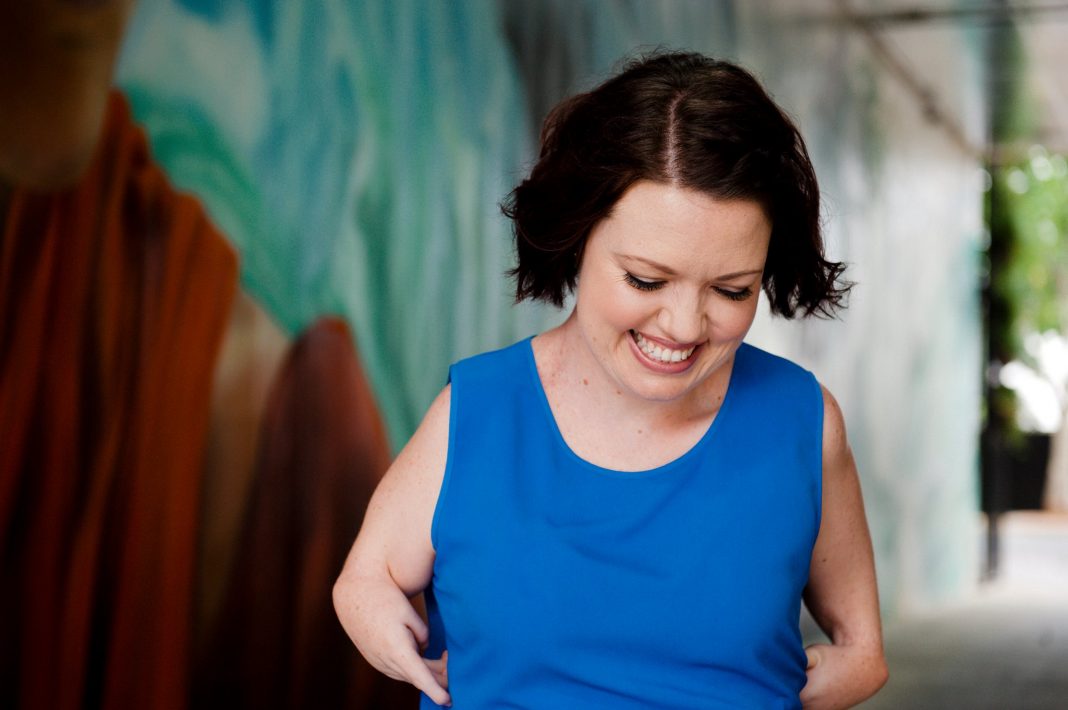Supporting an idol, odes to cats, and recognition as a disability ambassador, this year has been an exciting one for Canberra singer-songwriter Ruth O’Brien. Gently, the singer has carved out a place in the music scene with her fun, engaging, story-driven melodies.
Growing up shy with a desire to be more self-expressive, Ms O’Brien found her pathway to confidence when she switched PE lessons for a vocals class in school.
“The feeling that I got immediately from performing was this sense of that I was good at it and that was really important for me. Knowing there were a lot of things in my life that were challenging, and to be kind of naturally gifted in some way, I used that as a bit of anchor,” she says.
In the years since that life-changing class, Ms O’Brien’s career has gained her a following of local and national fans. Earlier this year, she supported her music hero, Katie Noonan in a few shows during the artist’s national tour.
Ms O’Brien also released an EP inspired by a great love, her cats. Songs for Abby is a fun, folk-infused album perfect for cat or music enthusiasts.
Logistics
Born with Thrombocytopenia-absent radius (TAR) syndrome means that Ms O’Brien has to put a bit more thought into how she logistically plans for a gig. There might be challenges with equipment, so the musician ensures someone is there to help with set-up and set-down, and she performs with either a backing track or other musicians.
“It affects me more in a positive way than anything; because of my physical appearance, I’m quite memorable and that is an advantage in a sea of people wanting to do music and be noticed,” she smiles.
According to Ms O’Brien, performers with disabilities are more common than people realise as many conditions are invisible; some impact energy levels, others mobility – it all comes down to the individual. She says a lot of venues around the country aren’t taking into account the varied needs of these performers.
“There’s not a lot of stages that are wheelchair accessible, they all require you to be able to lift your body weight off the ground … Then for people that have conditions that affect arms and hands like me, it can be hard to set things up. There are a number of things that need to be changed to allow more people with disability to even get on stage.”
A shift in attitude in what is expected of performers would be a great step in the right direction, Ms O’Brien says.
“All the other things, the logistical things, they can be adjusted. You can invent new things, you can make adaptions and bring in extra help when you need; it’s around creating a sense of equity. Disabled people are just as able to do things as everybody else, there does need to be removal of a lot of barriers for that to happen,” she says.

Accessibility and inclusivity
Even when attending events, people with disabilities need to do more research and planning; for example, the lack of elevators in places with steps is a barrier to many people. When designing infrastructure, she says different needs should be accounted for.
It isn’t just the physical access either. Ms O’Brien says it can be helpful to have options in busy and loud environments for all communication styles; someone who is D/deaf would struggle to order a drink in a packed venue.
“It can just be a really good thing, and at the end of the day, it’s just about good customer service and really putting the person first, regardless of what their condition is or their disability. It’s about treating them the same as they would anyone else,” she says.
One of the biggest barriers for a person with visible disabilities to enjoy an event is patronising behaviour, according to Ms O’Brien. Sometimes people assume they wouldn’t be able to do something and are then wowed when they can, she says, or questions about their condition or disability can be upsetting.
“It’s important to recognise people’s background and journey and certain comments can be potentially triggering,” explains Ms O’Brien. “Essentially, if you’re talking directly about someone’s disability, you’re talking about their medical history, which people without disabilities don’t have to often do. It’s quite personal to have to repeat these things again and again to people.”
Venues wanting to be more accessible and inclusive could reach out to people with different disabilities for their comments through appropriate channels, she suggests. An organisation like Accessible Arts offers consulting and advisory services by recruiting people with lived experience to guide processes and share their experience.
“There’s a few of us that do some disability work, but to be honest, I’ve kind of backed off from that a bit myself because it is quite exhausting. There is a high level of burnout around these things for people with disability because it’s not like we can just turn it off.”
Heading to Exhibition Park for the Canberra Disability Expo next month in her role of ambassador, Ms O’Brien says the event is a great way to find resources. Attending the expo previously, she found people who were genuinely passionate about working in the sector.
“There’s such an overwhelming amount of information on the internet and it’s hard to know where to go for what service. To just to get a feel for the company as well, it really makes a difference in making that choice about whether you want to even go with them,” she says.
Catch Ruth O’Brien at the Canberra Disability Expo at Exhibition Park, 1-2 September, and keep up to date with her via ruthmvobrien.com
Get all the latest Canberra news, sport, entertainment, lifestyle, competitions and more delivered straight to your inbox with the Canberra Daily Daily Newsletter. Sign up here.



